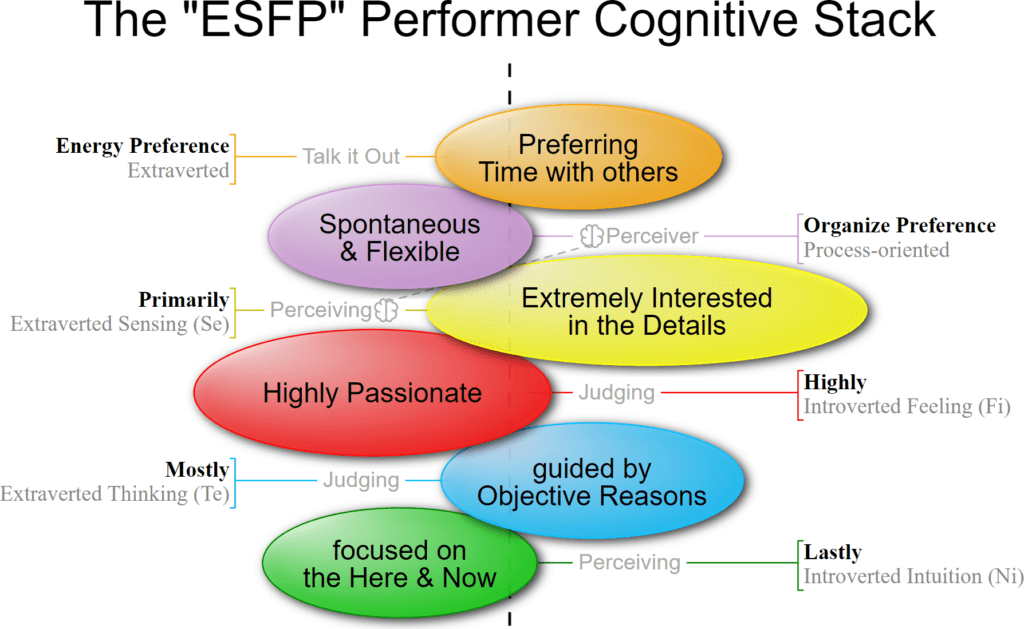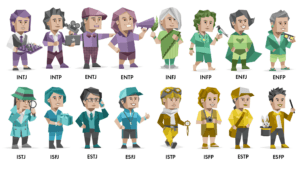What is the MBTI ESFP “Performer” Personality Type?

People with ESFP Personality Types are often described as spontaneous, resourceful, and outgoing.
They love being the center of attention and are often described as entertainers or “class clowns.”
Performers are easygoing, enjoy fun, and are usually good at sports and active exercises.
They have good common sense but can also be impulsive.
Performers are good at communication and do not like working alone.
With Extraverted Sensing as their dominant function, Performers are Perceivers, like gathering facts and being highly detail-oriented.
With Introverted Feelings as their principal Judging function, Performers use how they feel and personal subject values when making decisions.

They are guided by objective reasoning with their Extraverted Thinking and are focused more on the here and now, with their Introverted Intuition as their lowest function.
Performers are extraverted, preferring time with others to talk things out. They are process-oriented, spontaneous, and flexible.
Performers are “Concrete Perceivers” with Introverted Feelings and Extraverted Sensing. When feeling threatened, they will distract in a kinesthetic manner, with observable erratic physical gestures and posture changes, with less reliance on ideas. And they may behave with the Distractor Satir Communication Style.
ESFP Personality Type cross-reference
- Keirsey Type – Performer
- Temperament Type – Sanguine
- Animal Type – Golden Retriever
- DISC Type – Steadiness
- Socio-Communicative Type – Amiable
- True Colors – Orange
- Color Code – Yellow
- Personality Compass – South
- Occupational Type – Conventional
- Learning Type – Reflector
- Leadership Type – Accommodator
Enneagram Types
The Enneagram is a Personality Typing System comprising nine different types.

Dominant Function – Extraverted Sensing
- They prefer to focus on the here and now rather than thinking about the distant future.
- They also prefer learning about concrete facts rather than theoretical ideas.
- They don’t spend a lot of time planning and organizing. Instead, they like to keep their options open.
- When solving problems, they trust their instincts and put trust in their abilities to develop a solution.
- While reasonable and pragmatic, they dislike structure, order, and planning. Instead, they act spontaneously and do not spend much time developing a plan or schedule.
Auxiliary Function – Introverted Feeling
- They emphasize personal feelings more than logic and facts when making decisions.
- People with this personality type have an internal system of values on which they base their decisions.
- They are very aware of their emotions and empathetic towards others.
- They excel at putting themselves in another person’s shoes.
Tertiary Function – Extraverted Thinking
- This function is focused on enforcing order in the outside world. It is centered on productivity, logic, and results.
- Because this tends to be a weaker aspect of personality, they may not always feel secure sharing their judgments, significantly if it disrupts the group’s harmony.
Inferior Function – Introverted Intuition
- While this is the least prominent aspect of personality, this function can help them spot patterns and make connections in things they have observed.
- They are usually not adept at using logic to sort abstract concepts. Still, this sense can sometimes lead to flashes of insight and epiphanies about themselves or the world.
ESFP Traits
ESFPs are pleasant, harmonious, and spontaneous. People tend to find them warm, sympathetic, and extremely easygoing. They can sense what others are feeling and know how to respond.
The primary function of the ESFP is Extraverted Sensing, which means they let their feelings and experiences dictate their decisions.
Their auxiliary function is Introverted Feeling, in which they know what they value.
ESFPs like to live in the here and now. While fun-loving and do not shun the spotlight, they are more interested in living in the present and doing what feels right.
They dislike routine, enjoy new experiences, and always seek new adventures. ESFPs adore being in the spotlight and revel in the excitement and drama they see.
They prefer to learn through hands-on experience and dislike book learning and theoretical discussions. Because of this, students with ESFP personality types sometimes struggle in traditional classroom settings. However, they excel in situations where they can interact with others or learn through direct experience.
Strengths
- Optimistic and gregarious
- They enjoy people and socializing
- Focused on the present, spontaneous
- Practical
Weaknesses
- Dislikes abstract theories
- Becomes bored easily
- Do not plan ahead
- Impulsive
ESFP Relationships
Friendships
- They grow weary of the same old routines and are always ready for a new adventure.
- To keep up with this personality type, you must always be prepared for new experiences – from exploring new places to meeting new people.
- Keeping things interesting is essential, but they love to have a reliable co-conspirator who is as ready for fun as they are.
Personal Relationships
- As extraverts, ESFPs enjoy spending time with other people and have excellent interpersonal skills.
- They are good at understanding how other people are feeling and can respond to other people’s emotions in productive ways.
- For this reason, ESFPs can make good leaders and have a knack for mobilizing, motivating, and persuading group members.
- ESFPs are often described as warm, kind, and thoughtful, making them popular and well-liked by others.
- ESFPs enjoy meeting new people. Still, they also have a thirst for new experiences.
- They are generally focused on the present and will often be the first to try the newest ride at an amusement park or try out a new adventure sport.
Partner Relationships
- ESFPs tend to be honest and forthright in relationships.
- They don’t play games and are warm and enthusiastic in romantic relationships.
- One thing to remember is that ESFPs dislike conflict and tend to take any critical comments quite personally.
- While being straightforward in your relationship with an ESFP is essential, avoid being overly harsh or aggressive.
Parenting
- ESFP children are enthusiastic and energetic, which can be fun and exhausting for parents.
- You can help by providing plenty of outlets for this boundless energy.
- Sports, hobbies, and outdoor adventures are good fun sources for ESFP kids.
- While these kids are people-loving extraverts, they may need time alone to process their feelings when upset.
- Give them time before drawing them out to discuss their emotions.
ESFP Careers
- With their intense dislike for routine, ESFPs do best in careers with a lot of variety.
- Jobs that involve a great deal of socializing are also a great fit, allowing individuals with this personality type to put their considerable people skills to good use.
- Careers that involve a great deal of structure and solo work can be challenging for ESFPs.
- As a result, they often become bored in such situations.


